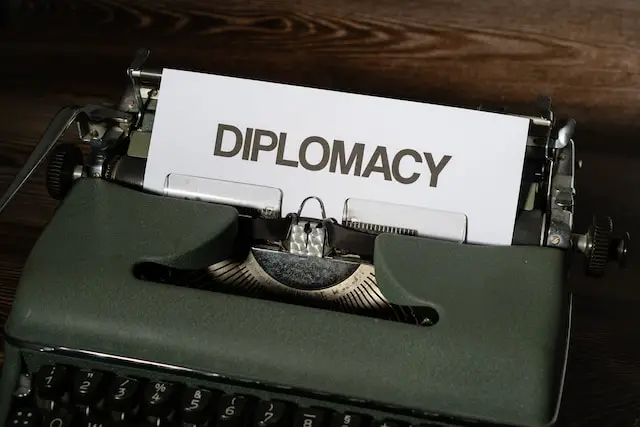Tact can be defined as the ability to communicate or behave in a sensitive manner that avoids causing offense or distress. Diplomacy refers to the skill of handling delicate matters and resolving conflicts through peaceful means.
Definition of tact

Tact, at its core, is the art of choosing and delivering words thoughtfully and considerately. It involves being sensitive to the feelings and perspectives of others while expressing oneself honestly. Tactful individuals possess a keen awareness of social dynamics and understand how their words can impact different situations.
In essence, tact revolves around finding the delicate balance between honesty and empathy. It requires finesse in communication – carefully selecting your words, tone, and timing to ensure that your message is received positively. Tactful people are skilled at diffusing tension, smoothing over conflicts, and preserving relationships through their thoughtful approach.
Tact goes beyond mere politeness; it embodies a deeper understanding of interpersonal dynamics. It allows us to express our opinions without alienating or hurting others in the process – fostering open dialogues where everyone feels valued and heard.
Definition of diplomacy

Diplomacy is a skill that involves the art of tactfully handling delicate situations and negotiations with grace, subtlety, and finesse. It is the ability to communicate effectively while maintaining positive relationships between individuals or countries. Diplomacy requires strategic thinking, adaptability, and an understanding of cultural differences.
At its core, diplomacy is about finding common ground and resolving conflicts through peaceful means. It involves carefully choosing words, actions, and gestures to convey messages in a way that promotes harmony rather than confrontation.
Effective diplomats possess excellent communication skills and are adept at navigating complex political landscapes. They have a deep knowledge of international relations and can navigate sensitive topics such as trade agreements, human rights issues, or territorial disputes with sensitivity.
Tact Vs. Diplomacy – Key differences
| Tact | Diplomacy | |
|---|---|---|
| Definition | The ability to communicate or act in a sensitive and considerate manner, especially in difficult or delicate situations. | The practice of conducting negotiations, managing conflicts, and building relationships between nations, organizations, or groups. |
| Focus | Interpersonal communication and individual interactions. | Broader issues, international relations, and complex negotiations. |
| Goal | Avoiding offense, maintaining positive relationships, and navigating sensitive topics with care. | Resolving conflicts, fostering cooperation, and achieving mutually beneficial outcomes. |
| Application | Personal relationships, social settings, and everyday conversations. | Politics, international affairs, business negotiations, and treaty agreements. |
| Skills | Empathy, discretion, and the ability to choose words and actions carefully. | Effective communication, negotiation, strategic thinking, and understanding cultural differences. |
Similarities between tact and diplomacy
Communication Skills: Both tact and diplomacy require effective communication skills to convey messages clearly, understand others’ perspectives, and navigate potentially sensitive situations.
Empathy: Both tact and diplomacy involve understanding and considering the emotions, needs, and concerns of others. Both emphasize the importance of putting oneself in someone else’s shoes.
Conflict Resolution: Tact and diplomacy share the objective of resolving conflicts. They seek to find common ground, promote understanding, and work towards mutually satisfactory solutions.
Relationship Building: Both tact and diplomacy prioritize building and maintaining positive relationships. They focus on establishing trust, respect, and rapport with individuals or groups involved.
Cultural Sensitivity: Both tact and diplomacy require an understanding and appreciation of cultural differences. They involve adapting communication and behavior to respect cultural norms and customs.
Strategic Thinking: Both tact and diplomacy involve strategic thinking and planning. They require considering long-term goals, anticipating potential consequences, and finding the most effective approaches to achieve desired outcomes.
Advantages of being tactful and diplomatic
Advantages of Being Tactful:
- Maintaining Positive Relationships: Tactful individuals are able to navigate sensitive topics and conflicts without causing offense or damage to relationships. This helps in preserving harmony and promoting positive interactions.
- Effective Communication: Tact allows individuals to communicate their thoughts and opinions in a considerate manner. It fosters understanding and encourages open dialogue by reducing defensiveness and promoting receptiveness.
- Conflict Resolution: Tact plays a crucial role in resolving conflicts by facilitating constructive discussions. It helps individuals express their concerns and find common ground, leading to mutually satisfactory solutions.
- Building Trust: Tactful individuals are perceived as trustworthy and respectful. Their ability to handle sensitive matters with sensitivity and care earns the trust and confidence of others, fostering stronger relationships.
- Professional Advancement: Tactfulness is highly valued in professional settings. It enhances teamwork, effective collaboration, and the ability to work well with colleagues, clients, and superiors.
Advantages of Being Diplomatic:
- Successful Negotiations: Diplomatic individuals excel in negotiations as they understand the importance of compromise, maintaining relationships, and seeking mutually beneficial outcomes. They can navigate complex discussions and achieve win-win solutions.
- Conflict Management: Diplomacy is instrumental in managing conflicts, whether on an interpersonal or international level. Diplomatic approaches help de-escalate tensions, promote dialogue, and find peaceful resolutions.
- Building Alliances: Diplomatic individuals have the ability to build alliances and forge partnerships. They can bridge cultural, political, and social gaps, fostering cooperation and collaboration among diverse groups.
- International Relations: Diplomacy is vital in establishing and maintaining positive relationships between nations. Skilled diplomats can navigate international politics, promote diplomatic solutions, and prevent or resolve conflicts.
- Preserving Reputation: Diplomatic behavior ensures that individuals or organizations are seen as respectful, professional, and reliable partners. This enhances their reputation and opens doors for future opportunities.
What is the value of tact and diplomacy?
The value of tact and diplomacy cannot be overstated. These qualities possess the power to navigate even the most challenging situations with grace and finesse. In our increasingly interconnected world, where diverse opinions abound, being able to communicate effectively is crucial.
Tact allows individuals to approach sensitive topics or deliver difficult messages without causing offense or discomfort. It involves carefully choosing one’s words and tone, considering the feelings and perspectives of others. Diplomacy, on the other hand, encompasses a broader scope as it refers to managing relationships between nations or organizations.
Both tact and diplomacy are essential in personal interactions as well as professional settings. They enable individuals to build strong relationships based on respect and understanding. By practicing tact and diplomacy, conflicts can be diffused before they escalate into irreparable damage.
Image Credits
Featured Image By – macrovector on Freepik
Image 1 By – Markus Winkler on Unsplash
Image 2 By – macrovector on Freepik








